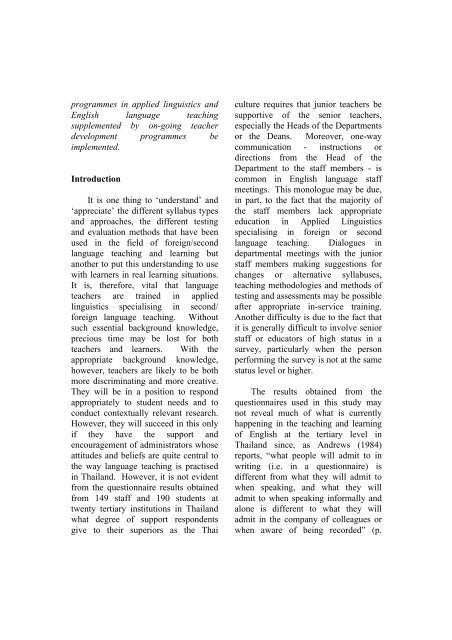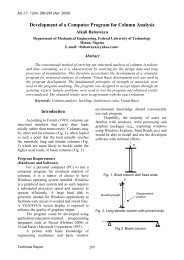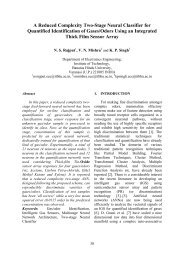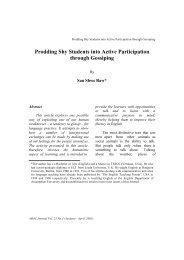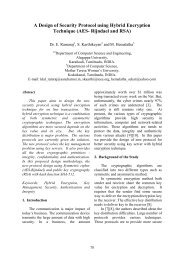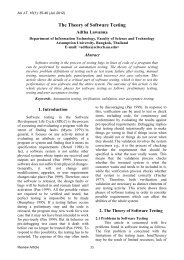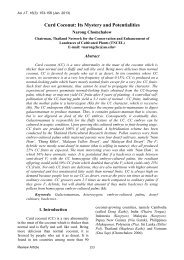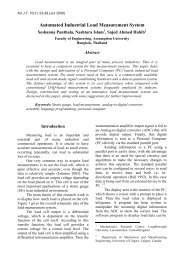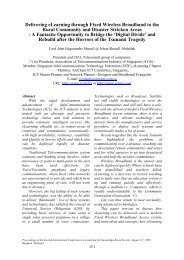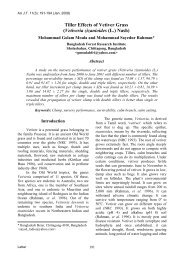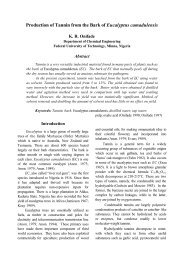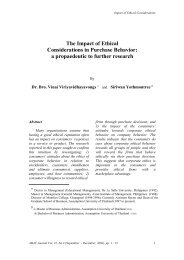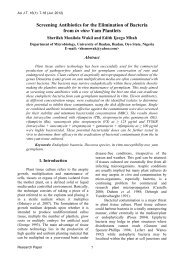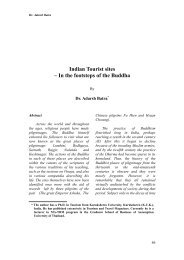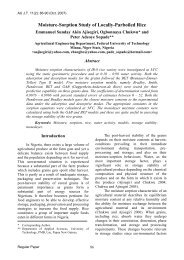PDF format - AU Journal - Assumption University of Thailand
PDF format - AU Journal - Assumption University of Thailand
PDF format - AU Journal - Assumption University of Thailand
You also want an ePaper? Increase the reach of your titles
YUMPU automatically turns print PDFs into web optimized ePapers that Google loves.
programmes in applied linguistics and<br />
English language teaching<br />
supplemented by on-going teacher<br />
development programmes be<br />
implemented.<br />
Introduction<br />
It is one thing to ‘understand’ and<br />
‘appreciate’ the different syllabus types<br />
and approaches, the different testing<br />
and evaluation methods that have been<br />
used in the field <strong>of</strong> foreign/second<br />
language teaching and learning but<br />
another to put this understanding to use<br />
with learners in real learning situations.<br />
It is, therefore, vital that language<br />
teachers are trained in applied<br />
linguistics specialising in second/<br />
foreign language teaching. Without<br />
such essential background knowledge,<br />
precious time may be lost for both<br />
teachers and learners. With the<br />
appropriate background knowledge,<br />
however, teachers are likely to be both<br />
more discriminating and more creative.<br />
They will be in a position to respond<br />
appropriately to student needs and to<br />
conduct contextually relevant research.<br />
However, they will succeed in this only<br />
if they have the support and<br />
encouragement <strong>of</strong> administrators whose<br />
attitudes and beliefs are quite central to<br />
the way language teaching is practised<br />
in <strong>Thailand</strong>. However, it is not evident<br />
from the questionnaire results obtained<br />
from 149 staff and 190 students at<br />
twenty tertiary institutions in <strong>Thailand</strong><br />
what degree <strong>of</strong> support respondents<br />
give to their superiors as the Thai<br />
culture requires that junior teachers be<br />
supportive <strong>of</strong> the senior teachers,<br />
especially the Heads <strong>of</strong> the Departments<br />
or the Deans. Moreover, one-way<br />
communication - instructions or<br />
directions from the Head <strong>of</strong> the<br />
Department to the staff members - is<br />
common in English language staff<br />
meetings. This monologue may be due,<br />
in part, to the fact that the majority <strong>of</strong><br />
the staff members lack appropriate<br />
education in Applied Linguistics<br />
specialising in foreign or second<br />
language teaching. Dialogues in<br />
departmental meetings with the junior<br />
staff members making suggestions for<br />
changes or alternative syllabuses,<br />
teaching methodologies and methods <strong>of</strong><br />
testing and assessments may be possible<br />
after appropriate in-service training.<br />
Another difficulty is due to the fact that<br />
it is generally difficult to involve senior<br />
staff or educators <strong>of</strong> high status in a<br />
survey, particularly when the person<br />
performing the survey is not at the same<br />
status level or higher.<br />
The results obtained from the<br />
questionnaires used in this study may<br />
not reveal much <strong>of</strong> what is currently<br />
happening in the teaching and learning<br />
<strong>of</strong> English at the tertiary level in<br />
<strong>Thailand</strong> since, as Andrews (1984)<br />
reports, “what people will admit to in<br />
writing (i.e. in a questionnaire) is<br />
different from what they will admit to<br />
when speaking, and what they will<br />
admit to when speaking informally and<br />
alone is different to what they will<br />
admit in the company <strong>of</strong> colleagues or<br />
when aware <strong>of</strong> being recorded” (p.


